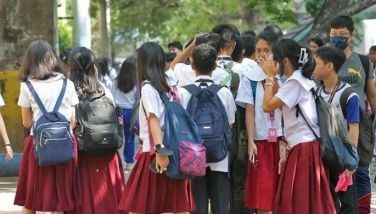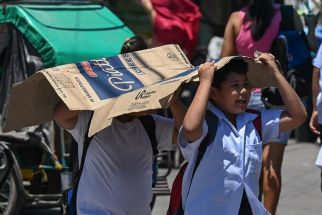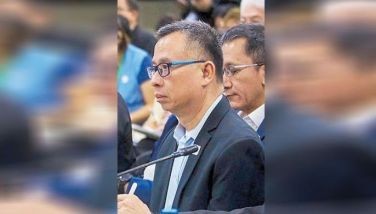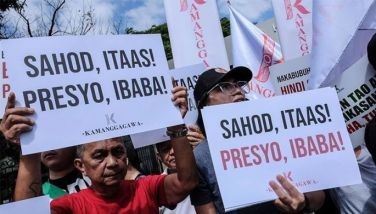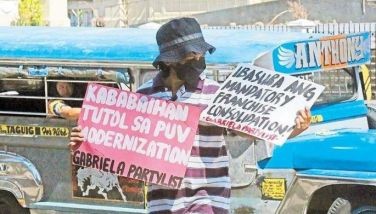Anti-terrorism law faces 20th legal challenge, this time from Cebu students
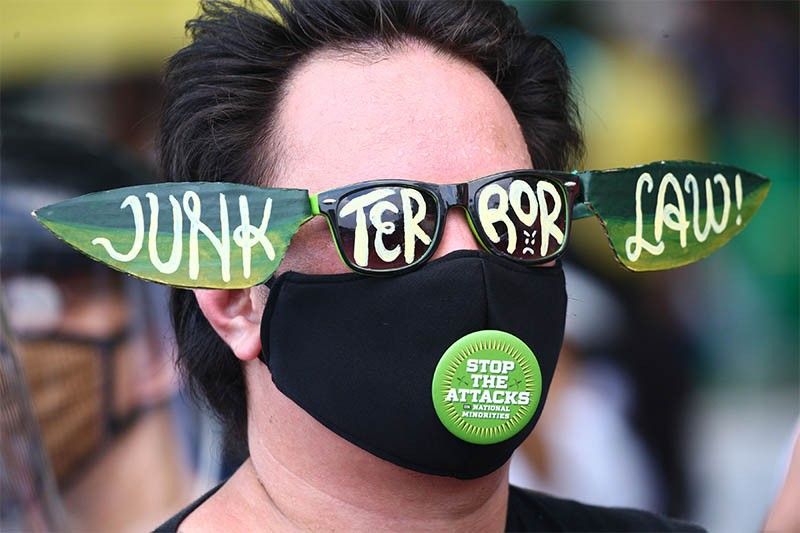
MANILA, Philippines (Updated 5:36 p.m.) — A group of students and youth leaders from Cebu on Tuesday assailed the constitutionality of the Anti-Terrorism Act of 2020 before the Supreme Court, the 20th legal challenge that the contentious law is facing.
Assisted by the Free Legal Assistance Group-Cebu, nine student leaders from colleges and universities in Cebu filed a Petition for Certiorari and Prohibition against Republic Act 11479 or the Anti-Terrorism Act of 2020.
Like earlier filed petitions, the youth leaders asked the high court to issue a preliminary or temporary restraining order against the implementation of the law, which took effect last week. They also urged the court to strike down the entire RA 11479 as unconstitutional.
As alternative decision, they said the SC may declare the Sections 4, 5, 6, 7, 9, 10, 11, 12, 16, 25, 26, 27, 29 and 46 as unconstitutional for violating several rights enshrined in the present Charter.
The youth leaders represent the Center of Youth Participation and Development Initiatives, Cebu Normal University, University of the Philippines Cebu, University of San Carlos and University of Cebu Law Student Society.
They named Executive Secretary Salvador Medialdea and members of the Anti-Terrorism Council as respondents.
“The ATA is akin to a sword of Damocles constantly hanging over the heads of this country’s freedom-loving citizens and for the generations to come, unless the same is expunged from the annals of our statue books,” their petition read.
While they acknowledged that protection of national security and public welfare is needed, these must not be done at the expense of the Filipino people’s liberties.
“The law, in itself, carries an evil that threatens to destroy the democratic fabric that binds our institutions and society together,” they added.
Vague definition terrorism tag on student protests
In making their case, the petitioners cited the arrest of three UP Cebu students on June 5 during a protest against the anti-terrorism law and another 16 student protesters who were also arrested for a similar action.
“As students, youth activists and members of cause-oriented groups and student organizations, petitioners stand to be greatly affected by the implementation of the ATA,” they said.
“If at all, the abovementioned arrests of student protesters already offer a terrifying glimpse to the petitioners where their right to express their dissent and to speak out against government excesses are effectively curtailed due to fear of being labelled as ‘terrorists,’ or worse, due to fear of arrest or prosecution,” the petitioners added.
The students cited the painting of Panday Sining members of a Manila underpass and students of the Polytechnic University of the Philippines who burned chairs to protest against a proposed 200-percent tuition fee increase. Police may allege that these actions intend to cause extensive damage to property and justify an arrest of these students as “terrorists.”
RELATED: There is more to graffiti than 'making a mess,' activists say
They also assailed the provision on inciting to commit terrorism, saying that the way this section was written “makes it possible to penalize any speech or expression which tends to ‘incite’ others to commit” acts listed under Section 4, which defines terrorism.
These may cover social media posts that say #AbolishGovernment and #OustDuterte, they said.
“Petitioners...humbly implore this Honorable Court to be on the ‘right side of history’—to uphold the fidelity of our Constitution and to safeguard the rights and welfare of the Filipino people by striking down RA 11479 as unconstitutional,” they also said.
President Rodrigo Duterte signed RA 11479 on July 3 amid still-growing dissent and opposition. The anti-terrorism law became in full force last week and is facing at least 20 constitutional challenges before the high court, coming from legal luminaries, lawmakers, academe, groups from different segments of society, journalists and youth leaders.
- Latest
- Trending

















